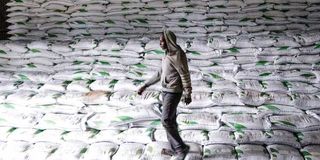Subsidised fertiliser budget cut has farmers worried

Bags of subsidised fertiliser at the National Cereals and Produce Board depot in Elburgon, Nakuru County, on Wednesday. The government has cut its allocation for subsidised fertiliser in its 2024/2025 budget estimates.
Farmers have expressed concern after the government slashed the allocation for the fertiliser subsidy programme from Sh16.2 billion to Sh10 billion in its estimates for the next financial year.
In the Sh3.9 trillion budget for the 2024/2025 financial year, small-scale farmers are some of the losers owing to the declining allocation to the agriculture sector, which the Kenya Kwanza administration pledged to revamp and transform.
The budget estimates for 2024/2025 show that the agriculture sector is to receive Sh47.45 billion, down from Sh49.9 billion in the current financial year.
“Farmers have been losing out in national budgetary allocations due to slashed funds to the sector, against the rising cost of farm inputs and unsteady market,” said Kenya Farmers Association Director Kipkorir Menjo during a farmers’ meeting in Eldoret.
“What the farmers require is allocation of additional funding, at least 10 per cent of the national budget, as per the Maputo declaration to lower production costs instead of introducing extra indirect taxes,” added Mr Menjo.
Pius Kirwa from Ziwa, Uasin Gishu County said: “The reduced allocation for subsidised fertiliser means most farmers will apply low quantities of the nutrients or miss out, which will compromise crop output.”
Rendering the investment unprofitable
Mr Kipruto Kirwa from Natwana village in Uasin Gishu cultivates 30 acres of maize, producing about 700 bags but the high cost of farm inputs—fertiliser and maize seed—is rendering the investment unprofitable.
He uses Sh6,000 per acre to plough and harrow the farm, an additional Sh1,500 per acre to plant, and another Sh4,500 for 25 kilogrammes of maize seed, enough for two acres.
“It costs me Sh2,500 per acre for top dressing, another Sh15,000 for herbicide and pest control, rendering the investment unprofitable,” said Mr Kirwa.
Small-scale farmers have described the declining budget allocation to agriculture as an indication that the government is not committed to tackling the recurrent food shortages.
“Food shortage will be unavoidable unless the government subsidises the cost of farm inputs and guarantees the market for the produce at good prices,” said Ms Susan Sum from Cheptiret.
“The budget allocation has overlooked small-scale farmers who contribute to food security at the household level at the expense of large-scale farming targeting cash crops targeting exports,” said Domenic Kirui, a food expert.
His sentiments were supported by David Maina from Mukunga farm, Trans Nzoia County, who added that food shortage would be unavoidable “unless the government subsidises the cost of farm inputs”.
He blamed cartels that have infiltrated the distribution channels for the mess in the sector.
“The government should put in place stringent measures to weed out the cartels responsible for importation of sub-standard farm inputs and cheap agricultural produce and thus messing up the sector that forms the backbone of our economy,” said Mr Maina.





